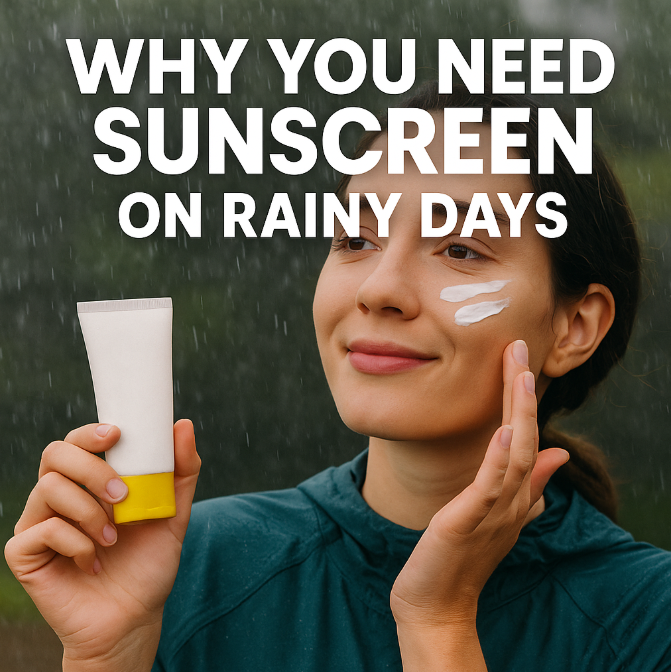
Do Clouds Really Protect Your Skin?
Be honest—how many times have you skipped sunscreen just because the sky looked cloudy or rain was in the forecast? It feels almost natural to assume that when the sun isn’t blazing, the risk is low. But here’s the truth: clouds don’t shield you from the damage. UVA rays, the silent culprits behind skin aging, can penetrate through clouds and windows, reaching your skin even when the sun hides away. That means wrinkles, fine lines, and pigmentation can creep up on you quietly if you leave your skin unprotected.
Understanding UVA and UVB Rays
The sun gives off two major types of rays that affect the skin—UVA and UVB. UVA rays are the long-wave villains responsible for premature aging. They cause wrinkles, sagging, and dark spots, and they can pass through clouds and glass with ease. UVB rays, on the other hand, are shorter waves that cause tanning and sunburn. Reflective surfaces like snow, glass, or even puddles of water during the rainy season can bounce UVB rays right back at you, intensifying their effects. This means sun protection isn’t a “summer-only” rule—it’s a year-round commitment.
Why Sunscreen is Non-Negotiable During Monsoon
Rainy days often feel like a break from the harshness of the sun. But the invisible UVA rays are still working overtime on your skin, breaking down collagen and worsening pigmentation. Consistent exposure without protection can lead not only to cosmetic concerns but also to long-term skin damage. Think of sunscreen as your all-weather shield—it’s just as important on drizzly mornings as it is on bright summer afternoons.
How to Choose the Right Sunscreen for Monsoon
Water-Resistant Formulation
When it rains, water resistance is a must. A water-resistant sunscreen ensures your protection doesn’t wash away with sweat or raindrops. It locks in hydration and stays put longer, so you don’t have to worry about reapplying too frequently.
Video : Should you wear sunscreen on a rainy day? | Monsoon special
Gel-Based Texture
Humidity is already sticky enough—why make it worse with greasy creams? Gel-based sunscreens glide on smoothly, absorb quickly, and leave a matte finish. They feel weightless, making them ideal for damp weather when your skin craves something light yet effective.
Non-Comedogenic Formula
If clogged pores and breakouts are your skincare nightmare, this is where you need to pay attention. Non-comedogenic sunscreens won’t block pores, which means no unwanted blackheads, whiteheads, or acne flare-ups. Look for this label especially if your skin is oily or acne-prone.
Broad-Spectrum Protection
Not all sunscreens are created equal. You need one that covers both UVA and UVB rays. Broad-spectrum sunscreens offer that dual protection. Always check the SPF too—30 or higher is the golden rule for daily use.
PA Ratings for Extra UVA Defense
Here’s a little secret most people overlook: PA ratings. They measure how well your sunscreen protects against UVA rays specifically. The more pluses, the stronger the shield.
- PA+ = Some UVA protection
- PA++ = Moderate protection
- PA+++ = High protection
- PA++++ = Extremely high protection
When shopping, go for PA+++ or PA++++ for maximum defense, especially in humid or tropical climates.
Choosing Sunscreen Based on Skin Type
Beyond labels, your skin type matters. If you have oily or acne-prone skin, avoid sunscreens with oxybenzone or heavy oils. Opt for lightweight, matte, or gel-based options. For dry skin, hydrating sunscreens with added moisturizers will be more suitable. Sensitive skin? Look for mineral sunscreens with zinc oxide or titanium dioxide for a gentler option.
Making Sunscreen a Daily Habit
The secret to youthful, healthy skin isn’t just about expensive creams or facials—it’s about consistency. Think of sunscreen as your skin’s seatbelt: you may not feel the impact immediately, but it’s protecting you from long-term damage every single day. Whether it’s raining, snowing, or shining bright, your skin deserves that layer of defense.
Video : Should I Wear Sunscreen on Rainy Days? – Beach Tour Guide
Conclusion: Your Skin’s Everyday Armor
Skipping sunscreen on rainy days may feel harmless, but UVA and UVB rays don’t take time off. Clouds, drizzle, or even winter skies won’t protect you from damage that builds up silently over time. The smartest choice you can make for your skin’s health and youth is simple: apply sunscreen daily, no matter the weather. Choose wisely—look for water-resistant, gel-based, non-comedogenic, broad-spectrum sunscreens with strong PA ratings. Protect your skin now, and you’ll thank yourself years later when your complexion still looks radiant and youthful.


